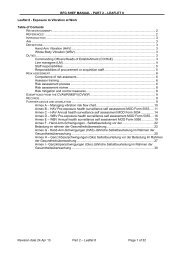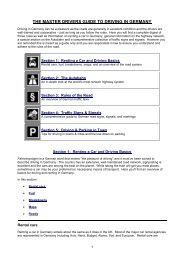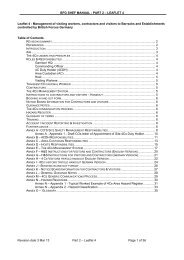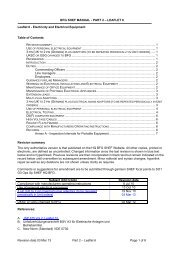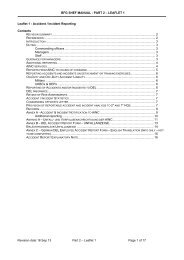Johann Wolfgang von Goethe - British Forces Germany
Johann Wolfgang von Goethe - British Forces Germany
Johann Wolfgang von Goethe - British Forces Germany
You also want an ePaper? Increase the reach of your titles
YUMPU automatically turns print PDFs into web optimized ePapers that Google loves.
<strong>Johann</strong> <strong>Wolfgang</strong> <strong>von</strong> <strong>Goethe</strong><br />
• <strong>Johann</strong> <strong>Wolfgang</strong> <strong>von</strong> <strong>Goethe</strong> was born in<br />
Frankfurt am Main, the first child of a lawyer<br />
<strong>Johann</strong> Caspar <strong>Goethe</strong>, and Katherine<br />
Elisabeth Textor, the daughter of the mayor<br />
of Frankfurt. <strong>Goethe</strong> had a comfortable<br />
childhood and he was greatly influenced by<br />
his mother, who encouraged his literary<br />
aspirations. After troubles at school, he<br />
received at home an exceptionally wide<br />
education. At the age of 16, <strong>Goethe</strong> began to<br />
study law at Leipzig University (1765-68), and<br />
he also studied drawing with Adam Oeser.<br />
• An unhappy love affair inspired <strong>Goethe</strong>'s first<br />
play, The Lover's Caprice (1767). After a<br />
period of illness, resumed his studies in<br />
Strasbourg (1770-71). <strong>Goethe</strong> practised law<br />
in Frankfurt (1771-72) and Wetzlar (1772).<br />
He contributed to Frankfurter Gelehrte<br />
Anzeigen (1772-73), and in 1774 he published<br />
his first novel, self-revelatory DIE LEIDEN<br />
DES JUNGEN WERTHERS. It depicted<br />
Werther's hopeless affair with Lotte Buff, the<br />
fiancée of a colleague. In the end the<br />
melancholic Werther romantically commits<br />
suicide, becoming the prototype of the<br />
Romantic hero.<br />
• In the 1790s <strong>Goethe</strong> contributed to Friedrich<br />
<strong>von</strong> Schiller´s journal Die Horen, published<br />
WILHELM MEISTERS LEHRJAHRE<br />
(Wilhelm Meister's Apprenticeship) in 1795-<br />
96, and continued his writings on the ideals of<br />
arts and literature in his own journal<br />
Propyläen. Wilhelm Meister's story had<br />
preoccupied the author for many years.<br />
Wilhelm is disillusioned by love, he starts<br />
actively to seek out other values, and becomes<br />
an actor and playwright.<br />
• The first part of his masterwork, Faust,<br />
appeared in 1808, and the second part in<br />
1832. <strong>Goethe</strong> had worked for most of his life<br />
on this drama, which depicted a disillusioned<br />
scholar, who makes a pact with Satan.<br />
<strong>Goethe</strong>'s story created a new persona for the<br />
Devil - Mephistopheles was a gentleman, who<br />
had adopted the manners of a courtier.<br />
Faust's lust for knowledge is limitless and he<br />
makes a contract with Mephistopheles: he will<br />
die at the moment he declares himself<br />
satisfied.
<strong>Johann</strong> <strong>Wolfgang</strong> <strong>von</strong> <strong>Goethe</strong><br />
• From 1791 to 1817 <strong>Goethe</strong> was the director of<br />
the court theatres and he advised Duke Carl<br />
August on mining and Jena University. He<br />
edited Kunst and Altertum (1816-32) and Zur<br />
Naturwissenschaft (1817-24). In 1812 <strong>Goethe</strong><br />
met the famous composer Ludwig van<br />
Beethoven in Teplitz. Beethoven had admired<br />
<strong>Goethe</strong> already in his youth, although he<br />
considered <strong>Goethe</strong>'s attitude toward the<br />
nobility too servile. Beethoven composed<br />
several music pieces based on the author's<br />
texts, among them Egmont. Franz Schubert's<br />
(1797-1828) first Lieder masterpiece,<br />
'Gretchen am Spinnrade', took the words<br />
from Faust.<br />
• At the age of 74 <strong>Goethe</strong> fell in love with the<br />
19-year old Ulrike <strong>von</strong> Levetzow. He followed<br />
her with high hopes from Marienbad to<br />
Karlsbad, and then returned disappointed to<br />
Weimar. There he wrote The Marienbad<br />
elegy, the most personal poem of his later<br />
years. <strong>Goethe</strong> died in Weimar on March 22,<br />
1832. He and Schiller, who died over a<br />
quarter of a century earlier, are buried<br />
together, in a mausoleum in the ducal<br />
cemetery. The <strong>Goethe</strong> House and Schiller<br />
House stand in the town, and the two statues<br />
of these literary giants are outside the<br />
National Theatre.<br />
• GÖTZ UND BERLICHINGEN, 1773<br />
• DIE LEIDEN DES JUNGEN WERTHERS,<br />
1774 –<br />
• IPHIGENIE AUF TAURIS, 1787<br />
• EGMONT, 1788<br />
• RÖMISHE ELEGIEN, 1790<br />
• FAUST, EIN FRAGMENT, 1790<br />
• TORQUATO TASSO, 1790<br />
• WILHELM MEISTERS LEHRJAHRE, 1796<br />
• HERMANN UND DOROTHEA, 1797<br />
• FAUST I, 1808<br />
• DER WAHLVERWANDTSCHAFTEN, 1809<br />
• ZUR FARBENLEHRE, 1810<br />
• ITALIANISCHE REISE I-II, 1816-17<br />
• WEST-ÖSTLICHER DIVAN, 1819<br />
• WILHELM MEISTERS WANDERJAHRE,<br />
1821<br />
• FAUST II, 1832<br />
• AUS MEINEM LEBEN. DICHTUNG UND<br />
WAHRHEIT, 1811-33
<strong>Johann</strong> Christoph Friedrich <strong>von</strong><br />
Schiller, 1759 - 1805<br />
• <strong>Johann</strong> Christoph Friedrich <strong>von</strong> Schiller was<br />
born on November 10, 1759, in Marbach,<br />
where his father worked for Duke Karl Eugen<br />
of Württemberg. When he was 13 years old,<br />
Schiller entered the Duke's military academy,<br />
the Karlsschule. He studied law and later<br />
turned to medicine. When he was 21 he was<br />
appointed to a Stuttgart regiment. Schiller<br />
was a foremost German dramatist and, along<br />
with <strong>Goethe</strong>, a major figure in German<br />
literature's Sturm und Drang period . The<br />
psychology of people in crisis is a theme in<br />
such plays as the Wallenstein cycle (1798-99),<br />
Mary Stuart (1800), The Maid of Orleans<br />
(1801), and William Tell (1804).<br />
• Schiller settled in Leipzig, where he wrote his<br />
first major poetic drama, Don Carlos (1787).<br />
The play, along with <strong>Goethe</strong>'s Iphigenie auf<br />
Tauris (1787), helped to establish blank verse<br />
as the recognized medium of German drama.<br />
• Schiller also wrote poetry and essays,<br />
including Ode to Joy, which was later used by<br />
Ludwig van Beethoven in his Ninth<br />
Symphony. He wrote several important<br />
treatises on aesthetics, foremost among them<br />
On the Aesthetic Education of Man, as much if<br />
not more of a moral treatise as an aesthetic<br />
one. His History of the Revolt of the United<br />
Netherlands (1788) won him fame as a scholar<br />
and led to his appointment as a professor of<br />
history at the University of Jena.<br />
• Schiller edited The Hours, a journal published<br />
by <strong>Johann</strong> Friedrich Cotta, and maintained a<br />
long correspondence with <strong>Goethe</strong>. He<br />
continued to write and translate and,<br />
beginning in 1798, produced his masterpiece,<br />
the Wallenstein cycle. Partly to be near<br />
<strong>Goethe</strong>, Schiller moved to Weimar in 1799.<br />
His health gradually failed, and he died in<br />
Weimar on May 9, 1805.
Heinrich <strong>von</strong> Kleist 1777–1811<br />
• German dramatic poet. He is one of the<br />
most evocative and disturbing of the<br />
German Romantic writers. Kleist<br />
served (1792–99) in the Prussian army<br />
and led an unhappy life that ended in<br />
suicide. His comedies include Der<br />
zerbrochene Krug (1806, tr. The Broken<br />
Pitcher, 1961) and Amphitryon (1807),<br />
after MoliEre. Among his passionate<br />
tragedies is Penthesilea (1808).<br />
Kathchen <strong>von</strong> Heilbronn (1810) is a tale<br />
of chivalry; his masterpiece is The<br />
Prince of Homburg, (1821, tr. 1956), a<br />
historical tragedy.<br />
• Kleist's terse, dynamic style and his<br />
sense of conflict : between reason and<br />
feeling, divine law and human law : are<br />
also evident in his novellas. Best known<br />
of these is Michael Kohlhaas (1810–11,<br />
tr. 1967) and The Marquis of O (1810–<br />
11, tr. 1978).
Heinrich Heine, 1797–1856<br />
• German poet, b. Düsseldorf, of a Jewish<br />
family. one of the greatest of German lyric<br />
poets, he had a varied career. After failing<br />
in business he tried law but found it<br />
uncongenial and finally turned to history<br />
and literature. His first published poems<br />
and plays established him as a young<br />
romantic.<br />
• Disillusioned with <strong>Germany</strong> and in<br />
political disgrace because of his liberal<br />
sympathies, he left for Paris (1831), where<br />
he supported the social ideals of the French<br />
Revolution, becoming for a time a Saint-<br />
Simonist. As the towering figure of the<br />
revolutionary literary movement Young<br />
<strong>Germany</strong>, he continued from Paris to<br />
disseminate French revolutionary ideas in<br />
<strong>Germany</strong>. He received a French<br />
government pension, worked as<br />
correspondent for German newspapers,<br />
and died after years of severe illness,<br />
during which he was nursed by his faithful<br />
"Mouche" (who used the pen name<br />
Camille Selden).<br />
• Heine's writing reflects strong influences<br />
of both classic and romantic German<br />
literature. Despite a conversion to<br />
Christianity, Jewish themes frequently<br />
figure in his works. His Buch der Lieder<br />
(1827, tr. Book of Songs, 1846), which<br />
contains the lyric cycles "Nordsee" and<br />
"Lyrisches Intermezzo," shows his<br />
indebtedness to the romantic folk-song<br />
poets. Other collections of poems are Neue<br />
Gedichte (1847), Romanzero (1851), and<br />
Letzte Gedichte (1853). Schumann<br />
composed music for Heine's poems, as did<br />
Schubert, Mendelssohn, Liszt. The most<br />
popular perhaps being "Die Lorelei," with<br />
melody by Friedrich Silcher (1789–1860).<br />
• Heine's later poems and especially his<br />
prose works established him as a satirist of<br />
barbed wit and as an embittered critic of<br />
romanticism, of jingoistic patriotism, and<br />
of current social and political affairs. Most<br />
poignant are Die Harzreise [Harz journey]<br />
(1826) and Reisebilder [travel pictures]<br />
(1827–31). Virtually all of Heine's works<br />
have been translated into English.
Theodor Fontane 1819–98<br />
• German writer. Although he is<br />
primarily important as a novelist, he<br />
did not begin to write fiction until he<br />
was almost 60 years old. Thereafter,<br />
during his last two decades, he<br />
produced almost a novel a year.<br />
• Earlier he had written two volumes of<br />
poetry, Gedichte (1851) and Balladen<br />
(1861), as well as accounts of his travels<br />
and his experiences as a war<br />
correspondent and prisoner during the<br />
Franco-Prussian War. He was also a<br />
drama critic for many years<br />
• The first master of the realistic novel in<br />
<strong>Germany</strong>, he wrote perceptive novels<br />
revealing the state of contemporary<br />
Berlin society and delineating the<br />
characters of its inhabitants. They<br />
include L'Adultera (1882) (tr. The<br />
Woman Taken in Adultery, 1979),<br />
Irrungen, Wirrungen (1888, tr. Trials<br />
and Tribulations, 1917), Frau Jenny<br />
Treibel (1893, tr. 1968, 1976), and his<br />
masterpiece, Effi Briest (1895, tr. 1976).<br />
• He also wrote short novels and the<br />
autobiographical Meine Kinderjahre<br />
(1894, tr. of extracts, My Childhood<br />
Days, 1913–15).
Bertolt Brecht 1898–1956<br />
• German dramatist and poet, b. Eugen<br />
Berthold Friedrich Brecht. His brilliant wit,<br />
his outspoken Marxism, and his revolutionary<br />
experiments in the theater have made Brecht<br />
a vital and controversial force in modern<br />
drama. His early plays, such as Baal (1919)<br />
and Drums in the Night (1922), are examples<br />
of nihilistic expressionism and caused riots at<br />
their openings, bringing Brecht instant<br />
notoriety. In Mann ist Mann [man is man]<br />
(1926), he began to develop his so-called epic<br />
theater, in which narrative, montage, selfcontained<br />
scenes, and rational argument were<br />
used to create a shock of realization in the<br />
spectator. In order to give the audience a<br />
more objective perspective on the action,<br />
Brecht promoted a style of acting and staging<br />
that created a distancing effect. Instead of<br />
identifying with their roles, actors were<br />
instructed merely to demonstrate the actions<br />
of the characters they portrayed.<br />
• Sets and lighting were designed to prevent the<br />
illusion of the theater from gaining sway, and<br />
Brecht revealed elements of the staging<br />
process itself. Songs played an important part<br />
: for these Brecht wrote the lyrics, with music<br />
by Hindemith, Kurt Weill, Hanns Eisler, and<br />
others. Under National Socialism Brecht went<br />
into exile (1933), settling in Denmark and<br />
later in the United States. Works written in<br />
his most mature phase include Mutter<br />
Courage und ihre Kinder [Mother Courage<br />
and her children] (1941) and Der gute Mensch<br />
<strong>von</strong> Sezuan (tr. The Good Woman of Setzuan,<br />
1943), both concerned with ethical conduct.<br />
An outstanding example of epic theater is Der<br />
Kaukasische Kreidekreis [the Caucasian chalk<br />
circle] (1955). From 1948, Brecht lived in East<br />
Berlin, where he directed the state-supported<br />
Berliner Ensemble. Notable English<br />
translations of Brecht's plays are those by<br />
Eric Bentley, which include Seven Plays by<br />
Bertolt Brecht (1961).
Gunter Grass 1927–<br />
• German novelist, lyricist, artist, and<br />
playwright, b. Danzig (now Gdansk, Poland).<br />
Writing from his experience in the Luftwaffe<br />
and as a prisoner of war, Grass deplores<br />
fascist militarism. The anguish of war and the<br />
social and political problems that West<br />
<strong>Germany</strong> faced before reunification are the<br />
principal concerns of his fiction.<br />
• His novel Die Blechtrommel (1959; tr. The Tin<br />
Drum, 1961) brought him world renown and<br />
revealed both a bizarre sense of humor and<br />
superb linguistic gifts. His second novel,<br />
Hundejahre (1963; tr. Dog Years, 1965), is a<br />
monumental work that also aroused<br />
considerable controversy. Set in Danzig, it<br />
deals, often grotesquely, with the Nazi years<br />
as it explores <strong>Germany</strong>'s destiny and<br />
conscience and the nature of individual flight<br />
from reality. Grass's early poems and plays<br />
are marked by a sensitivity for imagery and a<br />
tendency toward symbolism and ambiguity<br />
(see Selected Poems, tr. 1966; Four Plays, tr.<br />
1967; New Poems, tr. 1968).<br />
• His later works mainly reflect a period of<br />
intense political activism. Student unrest in<br />
Berlin and the political "generation gap" are<br />
the themes of his novel Ortlich betAubt (1969;<br />
tr. Local Anaesthetic, 1970) Grass's reflections<br />
on his life in Berlin and his political activities<br />
are the basis for the novel Aus dem Tagebuch<br />
einer Schnecke (1972; tr. From the Diary of a<br />
Snail, 1973). His highly acclaimed novel Der<br />
Butt (1977; tr. The Flounder, 1978), which<br />
contrasts the destructiveness of men with the<br />
sanity of women, examines such matters as<br />
politics, feminism, and the art of cooking.<br />
• Grass returned to nearly universal praise<br />
with Im Krebsgang (2002; tr. Crabwalk, 2002),<br />
his first 21st-century novel. Hauntingly<br />
descriptive, Grass uses the Soviet torpedoing<br />
of the German refugee ship Wilhelm Gustloff<br />
with the story of a German family, to<br />
illuminate various phases in 20th-century<br />
German history. The story moves, crablike,<br />
backward and forward through the detritus<br />
of crime and guilt in <strong>Germany</strong>'s recent past.



